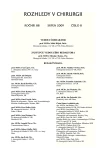-
Medical journals
- Career
The Operation Risks and the Force of Preoperative Management
Authors: M. Kaška
Authors‘ workplace: Chirurgická klinika FN v Hradci Králové, přednosta: doc. MUDr. Alexander Ferko, CSc. ; Katedra chirurgie LF UK v Hradci Králové, vedoucí: doc. MUDr. RNDr. Milan Kaška, Ph. D.
Published in: Rozhl. Chir., 2009, roč. 88, č. 8, s. 476-480.
Category: Monothematic special - Original
Overview
The aim of this article is to summarize the current actual knowledge in possibilities of examination of patients’ condition before surgery with respect to development of present operation risks and of a recovery phase in increased patients’ co-morbidity and age. Not only a profile of our patients has changed partially as was mentioned above, but also the new diagnostics methods, non-invasive and mini-invasive techniques have appeared, too. Also the new methods of preparation of surgical patients for surgery are arising during the last few years. They answer the previously presented points witch are established on an increased interest in the patients during the perioperative time period (ERAS-enhanced recovery after surgery/fast track). New methods appreciated an operation trauma, which has a substantial influence on the result of an operation. The most frequent risks of an operation must be presented: anaesthetic, respiratory, cardial, nutritive, thromboembolic, and other specific risks subjecting to an individual case. A knowledge of patients’ functional reserve is to be necessary and all these facts must not be underestimated in preparation of an operation type, mainly in wider reconstructions of gastrointestinal tract, at severe traumatic conditions, in vascular surgery, neurosurgery, cardiosurgery, urology and pediatric surgery.
Key words:
operation risk – preoperative examination – preoperative management
Sources
1. Hrnčiariková, D. Výskyt malnutrice a karenčních stavů u pacientů vyššího věku přijímaných do nemocnice. Vliv pobytu v nemocnici a možnosti nutriční podpory. Dizertační práce, LF UK, Hradec Králové, 2008, 160 s.
2. Guidelines for perioperative cardiovascular evaluation for noncardiac surgery. Circulation, 1996; 93 : 1286–1317.
3. Bruthans, J., Skalická, H. Doporučení pro přípravu kardiaka k nekardiální operaci. Cor. Vasa, 2001; 43(5): K101–K106.
4. Nicholls, A., Wilson, I. Perioperační medicína. Galén, Praha, 2006, 370 s.
5. Kagansky, N., Berner, Y., Koren-Morag, N., Perelman, L., Knobler, H., Levy, S. Poor nutritional habits are predictors of poor outcome in very old hospitalized patients. Am. J. Clin. Nutr., 2005; 82 (4): 784–791.
6. Zadák, Z. Výživa v intenzivní péči. Grada Publishing, Praha, 2002, 487 s.
7. Dorrens, J., Rennie, M. J. Effects of ageining and human whole body and muscle protein turnover. Scand. J. Med. Sci. Sports, 2003; 13(1): 26–33.
8. Gaillard, C, Alix, E., Salop, A., Beirut, G., Ritz, P. Energy requirements in frail elderly people: A review of the literature. Clinical Nutrition, 2007; 26 : 16–24.
9. Satinský, I., Mitták, M, Foltys, A., Kretek, J., Dostalík, J. Porovnání vlivů různých druhů umělé výživy na pooperační komplikace po velkých chirurgických výkonech. Rozhl. Chir., 2005; 84(3): 134–141.
10. Teplan, V. Diagnostická kritéria malnutrice. V Nutriční a metabolická podpora u kritických stavů a orgánového selhání. Editoři Z. Zadák, M. Anděl, E. Havel, L. Sobotka. Losenický, Nové Město n. Met., 2001 : 95–101.
11. Mullen, J. L., Buzby, G. P., Walkman, M. T., Gertner, M.H., Hobbs, C. L., Rosat, E. F. Prediction of operative morbidity and mortality by preoperative nutritional assessment. Surg. Forum,1979; 30 : 80–82.
12. Buzby, G. B., Mullen, J. L., Matthews, D. C, Hobbs, C. L., Rossato, E. F. Prognostic nutritional index in gastrointestinal surgery. Am. J. Surg., 1980; 139 : 160–167.
13. Buoillanne, O., Coulombel, I., Morineau, G., Vincent, J.-P., Nicolis, I., Benazeth, S., Aussel, C. Adaptation of Buzby‘s Nutritional Risk Index (NRI) to elderly patients: the Geriatric Nutritional Risk Index (GNRI). Featuring abstracts of 26th Congress of ESPEN, Lisabon, 2004 : 760.
14. ESPEN Guidelines for nutrition screening 2002. Clinical Nutrition, 2003; 22 : 415–421.
15. Krška, Z. Tromboembolická nemoc v chirurgii. Galén, Praha, 1998, 166 s.
16. Lochmann, O. Vademekum antiinfekční terapií. Triton, Praha, 2005, 161 s.
17. Cunha, B. A. Antibiotic essentials. Physician‘s Press, Michigan, 2003, 406 s.
18. Fearon, K. C. H., Ljungqvist, O., von Meyenfeld, M., Revhaug, A., Dejong, C. H. C., Larsen, K., Nygren, J., Hausel, J., Soop, M., Andersen, J., Kehlet, H. Enhanced recovery after surgery: a consensus review of clinical care for patients undergoing colonic resection. Clinical Nutrition, 2005; 24 : 466–477.
Labels
Surgery Orthopaedics Trauma surgery
Article was published inPerspectives in Surgery

2009 Issue 8-
All articles in this issue
- One-Year Survival Outcomes in Patients with Pancreatic Head and Portomesenteric Veins Resection
- An Optimum Miniinvasive Approach in Esophageal Replacement with Stomach
- GIST as a Cause of the Small Intestine Invagination
- Significance of the TPS Cytokeratin Marker in the Postoperative Follow Up of Colorectal Carcinoma Patients
- Transarterial Chemoembolization in Hepatocellular Carcinoma
- 120 Laparoscopic Adrenalectomies with a Harmonic Scalpel
- Crural Arteries PTA in Patients with Diabetes
- Posttraumatic Muscular Forearm Hernia
- Lesions in the Popliteal Fossa with Neurologic Symptomatology – Case Reports, Diagnostics and Treatment
- Treatment of the Elderly in the Regional Surgical Department
- Contribution of MRI to the Thoracolumbar Spine Injuries Diagnostics and Therapy
- Contribution of Abdominal Sonography in Acute Appendicitis Diagnostics – Our Experience
- PCCP versus Standard Proximal Femoral Nail in the Treatment of Pertrochanteric Femoral Fractures
- The Operation Risks and the Force of Preoperative Management
- Perspectives in Surgery
- Journal archive
- Current issue
- Online only
- About the journal
Most read in this issue- The Operation Risks and the Force of Preoperative Management
- Lesions in the Popliteal Fossa with Neurologic Symptomatology – Case Reports, Diagnostics and Treatment
- Transarterial Chemoembolization in Hepatocellular Carcinoma
- One-Year Survival Outcomes in Patients with Pancreatic Head and Portomesenteric Veins Resection
Login#ADS_BOTTOM_SCRIPTS#Forgotten passwordEnter the email address that you registered with. We will send you instructions on how to set a new password.
- Career

